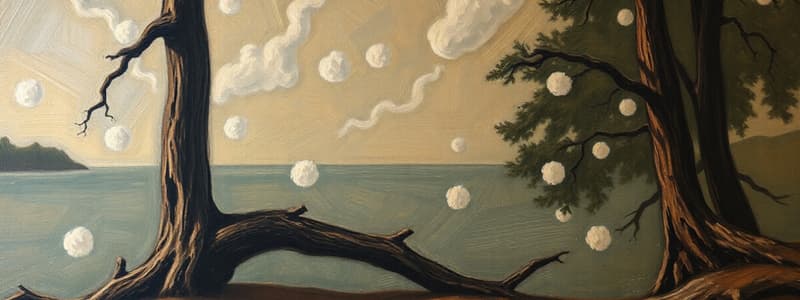Podcast
Questions and Answers
What is a primary characteristic that distinguishes hardwood from softwood?
What is a primary characteristic that distinguishes hardwood from softwood?
- Hardwood is generally used for interior constructions.
- Hardwood grows faster than softwood.
- Hardwood has a more complex wood grain structure. (correct)
- Hardwood comes from evergreen trees.
Which type of wood is characterized by being lightweight and quite strong?
Which type of wood is characterized by being lightweight and quite strong?
- Pine (correct)
- Ash
- Spruce
- Cedar
Which wood is recognized as a high-cost option due to its durability and aesthetic qualities?
Which wood is recognized as a high-cost option due to its durability and aesthetic qualities?
- Pine
- Mahogany (correct)
- Cedar
- Spruce
What common application is suited for plywood manufactured wood?
What common application is suited for plywood manufactured wood?
Which of the following types of trees is associated with softwood?
Which of the following types of trees is associated with softwood?
What property is common to all types of manufactured wood?
What property is common to all types of manufactured wood?
Which hardwood is characterized as being light brown and very durable?
Which hardwood is characterized as being light brown and very durable?
Which wood has a high cost and is commonly used for boat fittings?
Which wood has a high cost and is commonly used for boat fittings?
Which property is true regarding softwood compared to hardwood?
Which property is true regarding softwood compared to hardwood?
What is a common use for blockboard manufactured wood?
What is a common use for blockboard manufactured wood?
Study Notes
Natural Wood
- Softwood comes from evergreen, needle-bearing trees.
- Examples: Pine, Cedar, Spruce
- Softwood grows faster than hardwood.
- Often used in building material and manufactured wood.
- Hardwood comes from deciduous (leaf-shedding) trees.
- Examples: Ash, Oak, Mahogany
- Hardwood is generally slow-growing with distinct wood grain.
- Used in high-quality furniture, flooring, and decks.
Manufactured Wood
- Made from leftover wood waste from conversion or construction.
- Developed for industrial production, allowing for large, consistent sheets.
- Uses:
- Plywood: Thin wood sheets
- Blockboard: Small wood blocks
- Chipboard: Wood chips
- Fibreboard: Wood fibres
Natural Wood
- There are two main categories of natural wood: Softwood and Hardwood.
- Softwood comes from evergreen or needle-bearing trees known as conifers.
- Softwoods grow faster than hardwoods and are often used for construction and manufactured wood products.
- Some common Softwood types include Pine, Cedar, and Spruce.
- Each type of softwood has unique properties influencing its preferred uses and cost.
Softwood Examples
- Pine is straight-grained but knotty, strong, easy to work with, and affordable.
- Cedar is straight-grained, knot-free, light, durable, and costly.
- Spruce is strong, with small knots, resistant to splitting, but not durable.
Hardwood
- Hardwoods originate from deciduous trees.
- They grow slower than softwoods and are renowned for their strength, durability, and attractive grain patterns.
- Hardwoods are commonly utilized for high-quality furniture, flooring, decks, and other applications.
- Examples of Hardwood types include Ash, Oak, and Mahogany.
- Each hardwood has unique features influencing its uses and cost.
Hardwood Examples
- Ash is lightweight, flexible, tough, steam-bendable, and varnishes well, making it suitable for tool handles, cricket bat handles, ladders, and veneers.
- Oak is hard, tough, heavy, durable, and light brown, often used for furniture, garden furniture, boat building, and veneers. It becomes harder with age.
- Mahogany is reddish, medium weight, strong, durable, and prone to warping, commonly used for high-quality furniture, shop furniture, boat fittings, and veneers.
Manufactured Wood
- Manufactured wood is created using natural wood as raw materials – typically wood scraps and waste.
- This form of wood is designed for industrial production and creates consistent, large sheets.
- Common manufactured wood types include plywood, blockboard, chipboard, and fiberboard.
Studying That Suits You
Use AI to generate personalized quizzes and flashcards to suit your learning preferences.
Related Documents
Description
Explore the fascinating world of natural wood types, including softwood and hardwood, their sources, and uses. Learn about the characteristics of various tree species and discover how manufactured wood is created and utilized in construction and furniture. This quiz will test your knowledge on wood types and their manufacturing processes.



